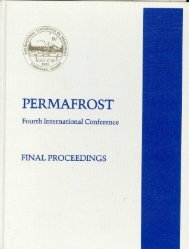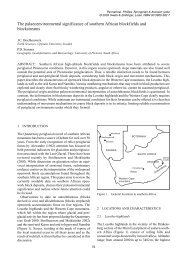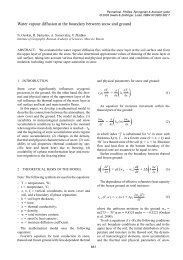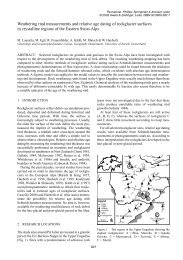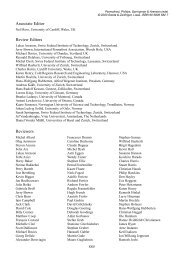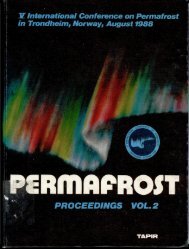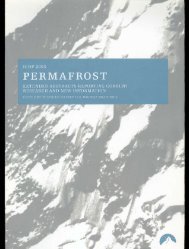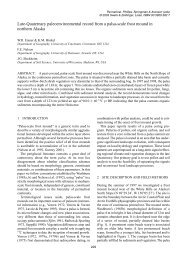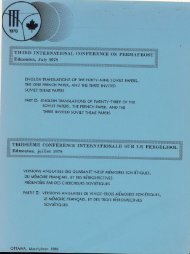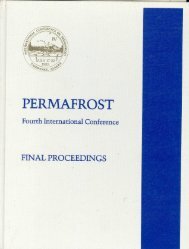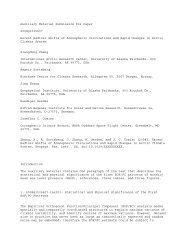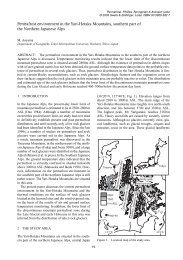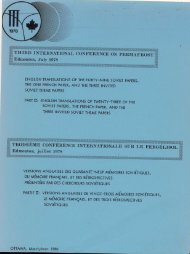Ninth International Conference on Permafrost ... - IARC Research
Ninth International Conference on Permafrost ... - IARC Research
Ninth International Conference on Permafrost ... - IARC Research
Create successful ePaper yourself
Turn your PDF publications into a flip-book with our unique Google optimized e-Paper software.
Climate Change in <strong>Permafrost</strong> Regi<strong>on</strong>s in North AmericaMaria K.GavrilovaMelnikov <strong>Permafrost</strong> Institute SB RAS, Yakutsk, RussiaIntroducti<strong>on</strong>In North America, permafrost occurs in three-fourths ofAlaska, half of Canada, and al<strong>on</strong>g the coasts and below icesheets in Greenland.MethodWeather stati<strong>on</strong> records have been used to analyze climatevariati<strong>on</strong>s during the last centuries. The method of 10-year moving averages has been used in the analysis, whichexcludes casual errors.Results and Discussi<strong>on</strong>For the Barrow stati<strong>on</strong> (the northern coast of Alaska)which has a relatively l<strong>on</strong>g record spanning from the 1910sto 2000s, the change of air temperature in winter was withinthe limits of similar values of mean annual temperaturefor January (-25.8°С) from the 1920s to 1970s. Significantcooling occurred in the 1910s (up to-29°С). Then, intensivewarming was observed in the 1970s. The winter airtemperature lowered nearly to the l<strong>on</strong>g-term average in the1990s and began to increase again in the 2000s.Summer temperatures changed less, within the limits of±1–1.5°С. Warming was observed in the 1920s, coolingin the 1950s, and warming in the 1990s. The mean annualtemperature which dictates whether the ground is frozenor unfrozen varied within ±1–1.5°С. Significant warmingoccurred in the 1930s, cooling was observed from the 1940sthrough the 1970s, and rapid warming has occurred sincethe 1990s to the end of the century. The latter warming wasdue to increases in both winter and summer temperaturesobserved in the last decades.For Fairbanks (central Alaska), the length of the recordis 20 years shorter than at Barrow. Significant cooling ofwinter temperatures of up to -30° (the l<strong>on</strong>g-term average is-23.2°) in the 1960s–1970s and significant warming in thelate 1970s–1980s (up to -19°) are evident. In the 1990s and2000s, temperatures decreased to the l<strong>on</strong>g-term average.Summer temperatures were lower than the average fromthe 1930s to 1960s, and have been persistently higher thanthe average since the 1970s. Mean annual temperatures werebelow the l<strong>on</strong>g-term average of -2.9° prior to the mid 1970s(up to -4°С), and have been higher since the mid 1970s (upto -2°).St. Bethel (southwestern Alaska) shows nearly the samevariati<strong>on</strong>s as Fairbanks, but <strong>on</strong>ly with a smaller range.Mt. Washingt<strong>on</strong> is situated in southern Alaska, and recordsare available since 1940. A significant increase in wintertemperatures was observed from the mid 1940s to mid 1960s,when temperatures reached -12.5°С, while the l<strong>on</strong>g-termmean is -15°. Then, cooling occurred in the 1960s–1980s(up to -17°). This cooling was followed by warming fromthe mid 1980s to mid 2000s. The last warming, however,was less in magnitude than the warming of the 1950s. Then,temperatures began decreasing again.Summer temperatures are surprisingly stable, varyingwithin the limits of ±0.5°С. The mean annual temperaturealso varied more or less stable. Slight warming occurred inthe mid 1950s, extended cooling from the mid 1950s–1980sand a steady temperature increase in the 1990s. All thesevariati<strong>on</strong>s were within the range of ±0.5°С.Unfortunately, in northern Canada, meteorologicalobservati<strong>on</strong>s were begun later, and recent data, probably, arenot published.At the Alert stati<strong>on</strong> located <strong>on</strong> the most northern extremityof the Canadian Archipelago, observati<strong>on</strong>s were apparentlybegun in the 1950s and ended in the 1990s. During thisperiod, there were two peaks in winter temperatures: asmaller <strong>on</strong>e in the 1950s and a larger <strong>on</strong>e in the 1970s (-29°at the mean of -32°). Then temperatures began to decrease.Summer temperatures were above the l<strong>on</strong>g-term averagein the 1950s–1960s and have been below the average sincethe latter half of the 1980s. There has been a slight increasingtrend in recent years. The mean annual temperature varied±0.5°С.Al<strong>on</strong>g the northern coast of the c<strong>on</strong>tinent (Aklavik stati<strong>on</strong>)there were alternating cold and warm winters within therange of typical variati<strong>on</strong>. Unfortunately, <strong>on</strong>ly the data priorto the mid 1960s are available for us.For the Frobisher Bay stati<strong>on</strong> (Baffin Island) data areavailable from the 1940s to 2000s. Winter warming wasobserved in the 1960s and the 1980s, similar in magnitude(-24°, while the l<strong>on</strong>g-term mean is -26.5°). In the mid1940s, late 1980s and 1990s, winter temperatures loweredto -29°С.After significant cooling in the mid 1980s and in the 1990s,summer and mean annual temperatures have increased by1–1.5°С in the early 2000s.The l<strong>on</strong>gest record for the permafrost regi<strong>on</strong> at our disposalis from the Churchill stati<strong>on</strong>, where observati<strong>on</strong>s began inthe 1890s. January temperatures increased significantly inthe 1940s and, in similar magnitude, in the 1980s and the1990s. During these warmer periods, temperatures were-25° to -25.5°, while the l<strong>on</strong>g-term average is -27.2°С.Increases in summer temperature were observed in thesec<strong>on</strong>d half of the 1930s and in the 1990s. The mean annualtemperature increased noticeably during the last decades ofthe 20th century, having reached -5.5° (the l<strong>on</strong>g-term normalis -7°С).Greenland stati<strong>on</strong>s, for which records are available, aresituated <strong>on</strong> the western coast. The l<strong>on</strong>gest record is from the81



